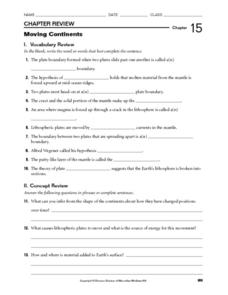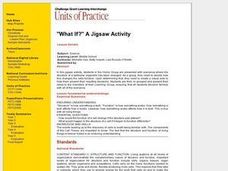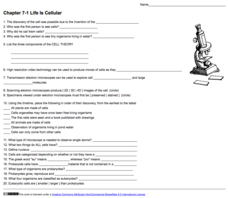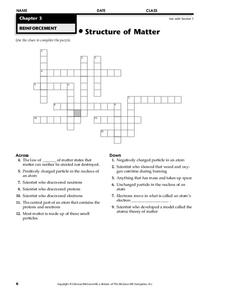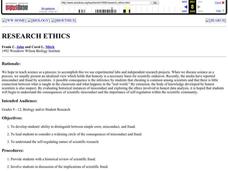Curated OER
Moving Continents
In this moving continents worksheet, students review the different types of plate boundaries, what causes earthquakes, and where volcanoes are formed. This worksheet has 10 fill in the blank and 9 short answer questions.
Curated OER
"What If?" A Jigsaw Activity
Students, in groups, consider a scenario in which some structure of a cell has been changed. They explore how structural change affects the function of a cell and create a visual aid to illustrate their observations.
Biology Corner
Life is Cellular
For this cells worksheet, students answer questions about the first person to see a cell as well as the evolution of microscopes. They define the parts of a cell and tell the differences between Prokaryotes and Eukaryotes. There are 20...
Curated OER
Structure of Matter
In this science puzzle worksheet, students solve a crossword puzzle related to matter. For example, "Scientist who discovered protons."
Curated OER
Three-dimensional cooperative modeling
Students explore what is present below the surface in order to drill into the ground and record the type of material that the drill brings to the surface. They discuss the benefits and drawbacks of distance communications. Students...
Curated OER
What Killed the Dinosaurs?
Students demonstrate how scientists use evidence to formulate hypotheses. They write an essay describing the Cretaceous and Paleocene time periods from the point of view of someone living in that time. In addition, they formulate...
Channel Islands Film
Island Rotation: Lesson Plan 3
How far have California's Channel islands moved? What was the rate of this movement? Class members first examine data that shows the age of the Hawaiian island chain and the average speed of the Pacific Plate. They then watch West...
Curated OER
The Dalton Model
In this Dalton worksheet, students read about John Dalton and his contributions to understanding the atom. Students are given sample data for Dalton's experiments and they answer questions about the data in his experiments.
Curated OER
Research Ethics
Students develop an ability to distinguish between simple error, misconduct and fraud. Students are lead to consider a widening circle of the consequences of misconduct and fraud. They expand their knowledge on the self-regulating...
Curated OER
Using Bloom's Taxonomy in Science
Help your students internalize knowledge by creating activities that utilize higher level thinking skills.
Curated OER
Human Evolution
Students investigate hominid evolution to learn the difference between a relative and an ancestor. They study the emergence of bipedalism and the related physical adaptations and cultural ramifications, and chart patterns of hominid...
Curated OER
The Big Bang-Hubble's Law
In this Hubble's law instructional activity, students use data for galaxies which include their distance and speed. Students make a graph to show the distance to each galaxy and the speed of each galaxy. They use their graph to answer 4...
Curated OER
Honors-Acid and Base Properties Homework
In this acid and base activity, high schoolers answer 8 questions about Arrhenius, Bronsted-Lowry, and Lewis bases. They determine Bronsted-Lowry conjugate acid-base pairs and they identify compounds and solutions as acids, bases or...
Curated OER
Mystery : Structure of the Atom-A Case for Indirect Evidence
Students investigate the structure of the atom through hands on activities. In this atomic structure lesson, students perform 4 activities showing indirect evidence of the structure of the atom and the parts of the atom. They also list...
Curated OER
The Story of the Atom
In this atom worksheet, students read about the model of the atom developed by Neils Bohr. Students complete 2 short answer questions based on what they read.
Society for Science & the Public
Easter Islanders Made Tools, Not War
When studying artifacts, especially tools, how do archaeologists determine what the devices were used for? In what ways might researchers' previous experiences influence their perception of an artifact? An article about researchers'...
Curated OER
Scientific Methods in Biology
In this scientific methods worksheet, students will review the steps necessary in testing a hypothesis including the types of reasoning and variables involved. This worksheet has 6 terms in a crossword puzzle and 4 fill in the blank...
Channel Islands Film
Cache: Lesson Plan 2 - Grades 4-6
Class members will dig this activity that has them trying their hand at recovering artifacts. Groups are assigned a section of a sandbox, carefully uncover the artifacts in their section, and then develop theories about who might...
Curated OER
How Gear Systems Work: A Research Project
Students apply information regarding simple machines along with the math concept "ratios." The teacher introduces the concept that technology is the application of scientific knowledge and mathematics concepts to solve a problem. This is...
American Chemical Society
Entropy and Enthalpy Changes
My room isn't messy — it's a scientific experiment in entropy! Scholars investigate entropy, enthalpy, and spontaneity through a guided procedure and set of questions. The lesson connects the Second Law of Thermodynamics, energy...
Curated OER
Evolution and Genes
In this psychology worksheet, learners complete 5 short answer questions about traits, mutations and the theory of natural selection.
Curated OER
On the Surface
Students draw and label the 15 major rivers in Texas. They then draw and label another map with the major lakes and reservioirs of Texas. Students use the maps and locate and label the location of the following major Texas cities:...
Curated OER
Reaction Reversibility
In this reaction reversibility worksheet, students find the equilibrium equation for a reaction of two gases and plot their concentrations over time. They answer 12 questions about the chemical reaction.
Curated OER
THEMIS: A Magnetic Case of 'What Came First?'
In this magnetic reconnection worksheet, students solve seven problems using the data and graphs from the THEMIS satellite constellations, which show a series of events triggered by a magnetic reconnection. Students interpret the data in...
